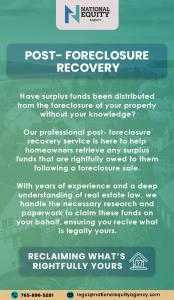
Steps To Claiming Surplus Funds After Foreclosure Sale
For example, if a property with a foreclosure judgment of $200,000 sells at auction for $225,000, the surplus funds would be $25,000.
Surplus funds, often referred to simply as "surplus," are the remaining funds generated from the sale of a foreclosed property when the auction price is higher than the total amount owed on the property. This surplus arises after satisfying all outstanding obligations, including the mortgage balance, taxes, liens, and any foreclosure-related expenses mandated by the court's final judgment. For example, if a property with a foreclosure judgment of $200,000 sells at auction for $225,000, the surplus funds would be $25,000.
While foreclosure can feel like an absolute loss, these funds can represent a beacon of potential financial relief – it is money that rightfully belongs to the former homeowner after all debts related to the foreclosure are paid off. Those with surplus money are encouraged to invest with the bank and are paid a certain rate of interest for the same. Surplus funds are also sometimes present when a homeowner has equity in the home at the time of the foreclosure sale. What are surplus funds/proceeds? If a parcel is sold at a foreclosure sale for an amount greater than the minimum bid.
When a lender forecloses on a property, it’s typically sold at a public auction. In California, a lender can foreclose either by going to trial or without going to trial, according to the Judicial Branch of California. Surplus liquidity refers to the excess funds or cash available in the banking system beyond the immediate requirements of banks and the economy. If your property is sold in a tax deed sale and the sale proceeds exceed the amount of taxes, interest, penalties, and costs owed, you are entitled to the surplus funds. Foreclosure: The money left over after a foreclosed home is sold at auction and all liens and lenders have been paid off. Those funds are called surplus funds. For example, there is a foreclosure judgment entered in the amount of $200,000. This is also known as excess funds or overage The weight of foreclosure can be crushing. Losing a home – a place filled with memories and dreams – is a devastating blow. The financial burden adds another layer of stress, leaving individuals and families scrambling to pick up the pieces. Yet, amidst the hardship, a glimmer of hope can emerge in the form of surplus funds.
Surplus Funds: A Beacon in the Storm
Surplus funds, also known as excess proceeds, arise when a foreclosed property sells for more than the total amount owed on the mortgage and all foreclosure-related expenses. This leftover money rightfully belongs to the former homeowner. While it won't erase the pain of losing a home, recovering surplus funds can offer much-needed financial relief during a critical time.
National Equity Agency Secures Another Rapid Surplus Refund for an Estate Heir
This concept can be complex and navigating the legalities is daunting. Here's where the National Equity Agency (NEA) steps in. We understand the emotional and financial toll of foreclosure. Our team of experienced legal professionals is dedicated to empowering homeowners and estates facing foreclosure to maximize their chances of recovering surplus funds.
Beyond Recovery: Achieving Rapid Surplus Refund
Time is of the essence when dealing with the aftermath of foreclosure. Financial burdens pile up quickly, and access to surplus funds can be crucial for stabilizing a situation. Recognizing this urgency, NEA prioritizes rapid surplus refunds. We utilize efficient processes and experienced professionals to expedite the recovery process, ensuring you receive the money you deserve as quickly as possible.
What is a Rapid Surplus Refund: National Equity Agency Explains: At NEA, we believe that knowledge empowers homeowners facing foreclosure. Here’s a breakdown of frequently asked questions (FAQs) regarding surplus funds:
1. What are Surplus Funds?
Surplus funds in real estate refer to the remaining proceeds from a property sale after all debts, including the mortgage and foreclosure expenses, have been paid off. At the National Equity Agency (NEA), we help homeowners recover these excess proceeds, turning their financial challenges into stories of hope and empowerment.
2. How Do I Know If There Are Surplus Funds After a Foreclosure Sale?
Surplus funds arise, and potentially become surplus funds with NEA’s help, when a property is sold for more than the total owed debts. This can happen due to a favorable market or a skilled negotiator.
This focus on swift action goes beyond just efficiency. It's about acknowledging the human element of foreclosure. Many individuals facing foreclosure are already dealing with a significant amount of stress and uncertainty. NEA strives to alleviate some of that burden by providing a clear path to reclaiming surplus funds and regaining a sense of financial control. Surplus funds are the extra money gained from a foreclosure sale. Sometimes properties will sell at auction for more than what is owed These surplus funds are typically paid to the former property owner after all the debts and costs associated with the sale have been covered. Surplus funds, also known as excess proceeds, are the remaining funds from a foreclosure sale after the mortgage and other liens have been paid off. Recovering these funds can be a complex and daunting process. Surplus funds are extra monies above the foreclosure judgment amount held by the Clerk of Court following a sale in a foreclosure case. The National Equity Agency (NEA) specializes in helping individuals navigate this intricate landscape to reclaim what rightfully belongs to them. Below, we answer some of the most frequently asked questions about surplus funds and how NEA can assist you. In Florida, the owner of record on the date a lis pendens is filed is generally entitled to surplus funds after subordinate lienholders have filed claims. However, anyone claiming the funds as an assignee of the owner of record's rights must prove their entitlement to the court. To claim surplus funds, you must submit a claim to the court and to the trustee, who will then review your claim and determine if you are owed funds. If you don't claim the funds within a certain time frame, the court will keep them. You may also need to participate in court proceedings and hearings before receiving the funds. Surplus funds, often referred to simply as “surplus,” are the remaining
Either way, the goal of foreclosure is to recover the amount owed by the homeowner. However, it’s not uncommon for these properties to fetch a higher price than the debt amount due to market conditions or property desirability. Surplus funds refer to the residual money left over after a property has been sold through foreclosure auction.
(a) “Owner of record” means the person or persons who appear to be owners of the property that is the subject of the foreclosure proceeding on the date of the filing of the lis pendens. In determining an owner of record, a person need not perform a title search and examination but may rely on the plaintiff’s allegation of ownership in the complaint when determining the owner of record.
(b) “Subordinate lienholder” means the holder of a subordinate lien shown on the face of the pleadings as an encumbrance on the property. The lien held by the party filing the foreclosure lawsuit is not a subordinate lien. A subordinate lienholder includes, but is not limited to, a subordinate mortgage, judgment, tax warrant, assessment lien, or construction lien. However, the holder of a subordinate lien shall not be deemed a subordinate lienholder if the holder was paid in full from the proceeds of the sale.
(c) “Surplus funds” or “surplus” means the funds remaining after payment of all disbursements required by the final judgment of foreclosure and shown on the certificate of disbursements.
(2) There is established a rebuttable legal presumption that the owner of record on the date of the filing of a lis pendens is the person entitled to surplus funds after payment of subordinate lienholders who have timely filed a claim. A person claiming a legal right to the surplus as an assignee of the rights of the owner of record must prove to the court that such person is entitled to the funds. At any hearing regarding such entitlement, the court shall consider the factors set forth in s. 45.033 in determining whether an assignment is sufficient to overcome the presumption. It is the intent of the Legislature to abrogate the common law rule that surplus proceeds in a foreclosure case are the property of the owner of the property on the date of the foreclosure sale.
(3) During the period that the clerk holds the surplus pending a court order:
(a) If the owner of record claims the surplus before the date that the clerk reports it as unclaimed and there is no subordinate lienholder, the court shall order the clerk to deduct any applicable service charges from the surplus and pay the remainder to the owner of record. The clerk may establish a reasonable requirement that the owner of record prove his or her identity before receiving the disbursement. The clerk may assist an owner of record in making a claim. An owner of record may use the following form in making a claim:
General Understanding of Surplus Funds
Q: What are surplus funds?
A: Surplus funds, often referred to simply as “surplus,” are the remaining funds generated from the sale of a foreclosed property when the auction price is higher than the total amount owed on the property.
Q: How do surplus funds arise in a foreclosure?
A: Surplus funds arise after all outstanding obligations, including the mortgage balance, taxes, liens, and foreclosure-related expenses mandated by the court’s final judgment, are satisfied. The remaining amount from the auction sale constitutes the surplus.
Q: Can you give an example of surplus funds?
A: Sure. If a property with a foreclosure judgment of $200,000 sells at auction for $225,000, the surplus funds would be $25,000.
Eligibility and Claims
Q: Who is entitled to claim surplus funds after a foreclosure?
A: Typically, the former homeowner is entitled to claim surplus funds. However, if there are subordinate lienholders, they might have the first claim on the funds.
Q: What if there are other claims on the property?
A: Surplus funds might first go towards satisfying any subordinate liens or secondary mortgages before being available to the former homeowner.
Q: How can I find out if there are surplus funds after my foreclosure?
A: You should receive a notification from the trustee or the court. Alternatively, you can check the foreclosure records or contact the trustee directly.
Process of Claiming Surplus Funds
Q: What steps are involved in claiming surplus funds?
A: Generally, the process involves:
1. Proof of Ownership: Providing documentation such as a copy of the property title.
2. Verification of Surplus Funds: Reviewing foreclosure records and the certificate of disbursements.
3. Contacting the Trustee: Informing the lienholder or bank about your claim.
4. Submitting a Claim: Filing a claim with the trustee and the court.
5. Court Hearings: Attending any necessary hearings or court proceedings.
Q: What documents are needed to claim surplus funds?
A: You will typically need the property title, foreclosure records, and any correspondence such as the Deposit of Surplus Funds letter.
Q: How long does it take to receive surplus funds once a claim is filed?
A: The timeframe can vary, but it generally takes several weeks to a few months to process and disburse the funds.
Legal and Procedural Details
Q: What happens if there is a dispute over surplus funds?
A: If there are disputes, the court may need to determine the rightful claimant based on priority and legal entitlement.
Q: Are surplus funds taxable?
A: Yes, surplus funds are generally considered taxable income. It is advisable to consult with a tax professional to understand any tax implications.
Q: Can I claim surplus funds from a foreclosure that happened years ago?
A: Yes, it is possible to claim surplus funds from an older foreclosure, as long as the funds are still available.
Special Cases and Scenarios
Q: What if I missed the notification about surplus funds?
A: If you did not receive or missed the notification, you should contact the trustee or check public records to verify the existence of surplus funds.
Q: Can surplus funds be used to settle other debts?
A: Yes, surplus funds can be used to settle any outstanding debts such as second mortgages or liens before being disbursed to the former homeowner.
Q: What role does National Equity Agency play in recovering surplus funds?
A: National Equity Agency specializes in guiding individuals through the complex process of recovering surplus funds, ensuring that all necessary documentation is provided and claims are filed correctly.
Foreclosure and Surplus Funds Specifics
Q: What are surplus funds in the context of a foreclosure?
A: Surplus funds in a foreclosure context refer to the excess money generated from the auction sale of a foreclosed property after all debts and foreclosure-related costs are paid.
Q: Are surplus funds always available after a foreclosure?
A: No, surplus funds are only available if the auction sale price exceeds the total debts and expenses. If the sale price is lower, there will be no surplus funds.
Q: Can a former homeowner lose the right to claim surplus funds?
A: Yes, if the former homeowner does not claim the funds within a specified time frame, the funds may be forfeited to the court or other claimants.
Q: How can I ensure I don’t lose surplus funds from my foreclosure?
A: Stay informed throughout the foreclosure process, promptly respond to notifications, and consider engaging with professionals who specialize in surplus recovery.
Understanding Surplus Funds Better
Q: What happens to surplus funds if not claimed?
A: If surplus funds are not claimed within a certain period, they may be transferred to the court or escheat to the state.
Q: Is there a time limit to claim surplus funds?
A: Yes, there is typically a time limit for claiming surplus funds. The specific duration varies by jurisdiction and should be checked with the relevant court or trustee.
Q: Can surplus funds be claimed after bankruptcy?
A: Claiming surplus funds after bankruptcy can be complex and may require legal assistance to navigate the process, as it involves both foreclosure and bankruptcy laws.
Eric Malone
National Equity Agency
+1 (812) 413-5465
email us here
Visit us on social media:
Facebook
LinkedIn
Instagram
YouTube
Other
Distribution channels: Banking, Finance & Investment Industry, Companies, Law, Real Estate & Property Management, World & Regional
Legal Disclaimer:
EIN Presswire provides this news content "as is" without warranty of any kind. We do not accept any responsibility or liability for the accuracy, content, images, videos, licenses, completeness, legality, or reliability of the information contained in this article. If you have any complaints or copyright issues related to this article, kindly contact the author above.
Submit your press release




